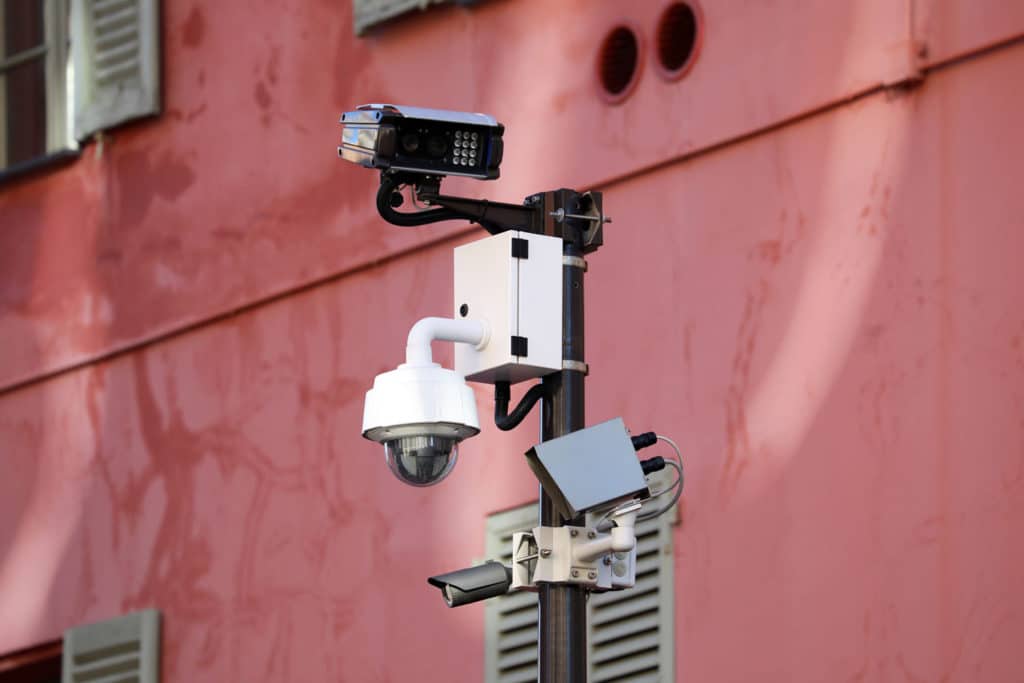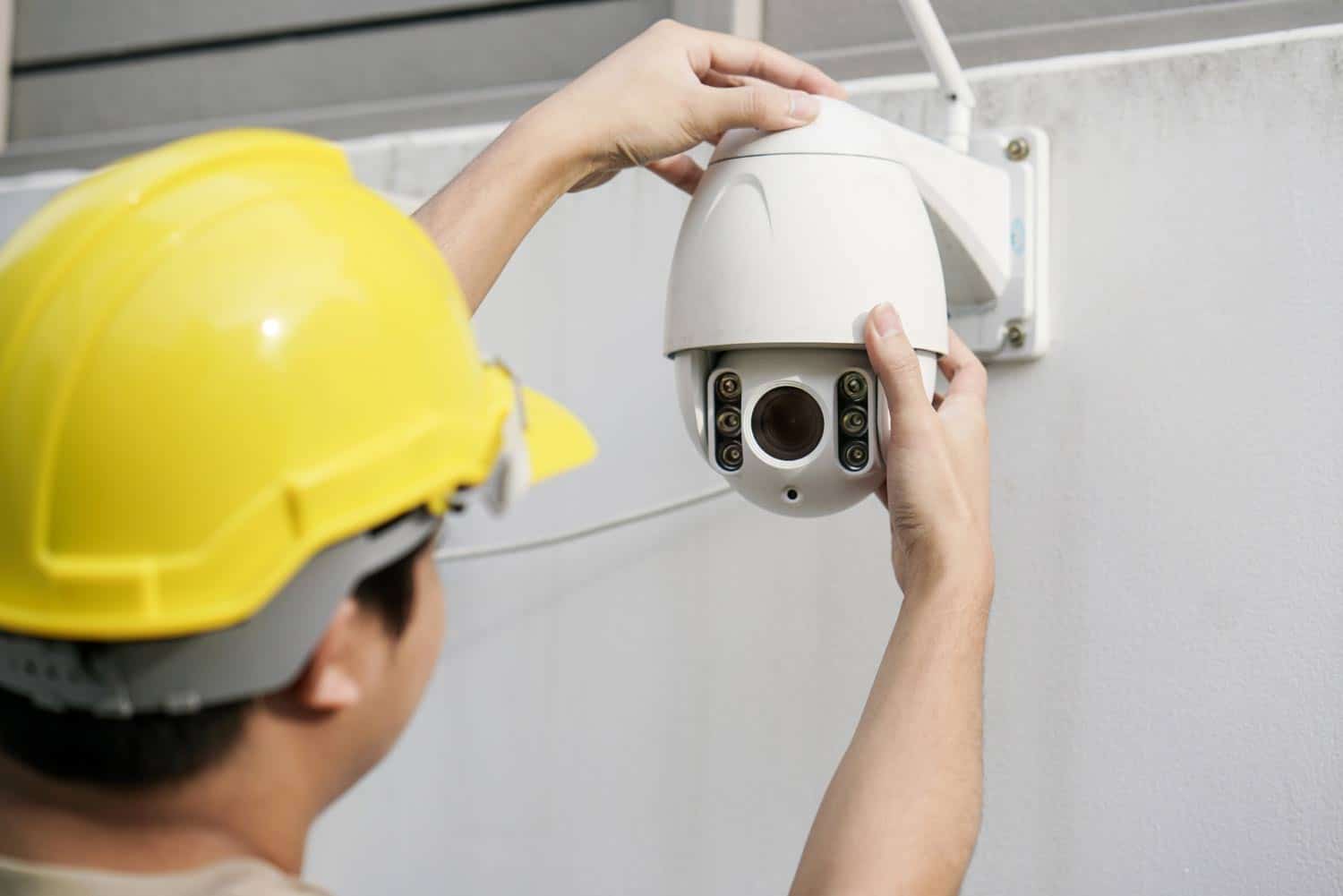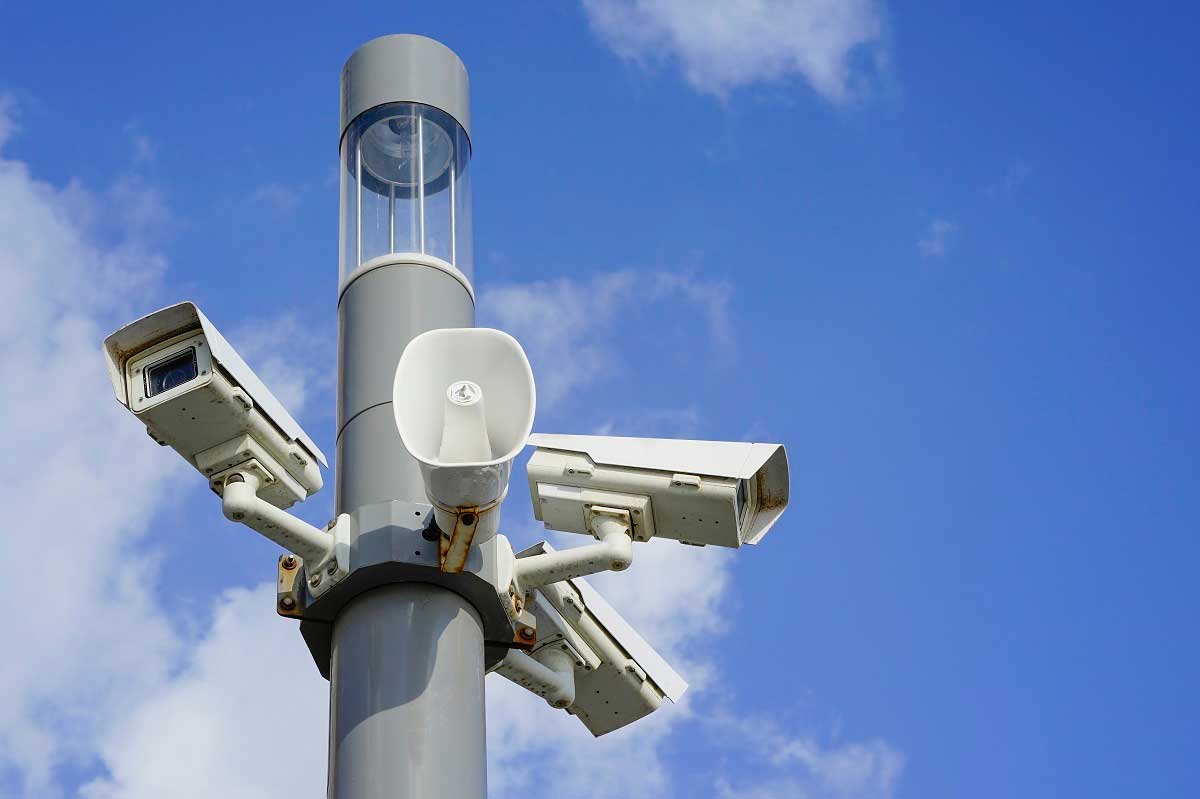Quick Answer:
The key difference between IP cameras and analog CCTV cameras is that IP cameras transmit digital video over a network, offering HD quality, cloud storage, remote viewing, and smart features like motion detection and AI analytics. Analog CCTV cameras send footage over coaxial cables to a DVR, with lower resolution and limited remote access. IP systems cost more upfront but are scalable and future-ready, making them ideal for businesses that want high-quality, flexible, and intelligent surveillance.
Want to learn more? Read on!
Today’s digital security cameras are light years ahead of older CCTV analog models. But what is the main difference? IP (Internet Protocol) cameras digitally transmit a signal, while analog CCTV (closed-circuit television) cameras send footage over a cable the old-fashioned way. But these aren’t the only difference between analog vs. IP cameras. There are also a host of advanced features in new, digital, Internet-enabled cameras that older analog CCTV cameras simply lack. These features give business owners new ways to keep an eye on their properties and deter any malicious activity. Here’s what you should know about analog CCTV cameras vs. IP cameras.
What Are Analog Cameras? What Are IP Cameras?
Before we can really dive into the differences between analog CCTV vs. IP cameras, we need to understand what we mean when we talk about these things. So, let’s answer the question: What is an analog camera, exactly? What is a digital camera?
What Is An Analog Camera?
“Analog” refers to methods of transmitting data and feedback through physical means, rather than digital ones. If you listen to music in an .mp3 format, it’s digital; if you’re listening to it on a vinyl record, it’s analog.
An analog camera records video by taking in light through a lens and recording it on a physical medium, usually tape or film. It is possible to monitor the feed of an analog CCTV camera in real time — imagine a security guard watching a bank of monitors in a movie — but it almost always requires a hard-wired connection, i.e., there must be a physical cable between the monitor and the camera.
How does an analog camera work?
Analog video surveillance cameras capture visual information and transmit it as electrical signals over coaxial cables directly to a DVR (Digital Video Recorder). The DVR then converts these analog signals into digital format for storage and playback. While straightforward and reliable, this setup is limited in image quality and remote accessibility compared to newer IP-based systems.
What Is An IP Camera?
As opposed to analog formats, an IP camera records data digitally and stores it on a hard drive. IP cameras aren’t just digital cameras, though. “IP camera” is short for “Internet Protocol camera,” and it’s called that because it can connect to the internet.
Because IP cameras store images as data rather than physically on a tape, the image feed can be viewed from just about anywhere with an internet connection. IP cameras don’t need to be hard-wired; they can connect to Wi-Fi networks and send data wirelessly.
How does an IP camera work?
IP surveillance camera systems use Internet Protocol to capture, process, and transmit video data over a network. Each camera has its own IP address and can send high-resolution footage to a Network Video Recorder (NVR) or directly to cloud storage. This approach allows for advanced features like remote monitoring, motion detection, and integration with other smart devices.
Analog vs IP Security Cameras: Side-by-Side Comparison
|
Feature |
IP Camera |
Analog CCTV Camera |
|
Video Quality |
High-definition (up to 4K) |
Low resolution |
|
Connectivity |
Wireless or wired |
Wired only |
|
Remote Access |
Yes, via web/app |
Limited |
|
Storage |
Cloud/NVR |
DVR only |
|
Smart Features |
Yes (AI, motion detection, etc) |
Minimal |
|
Cost |
Higher upfront |
Lower upfront |
|
Scalability |
Easy to expand |
Limited by DVR |
|
Compatibility |
Works with smart building systems |
Compatible with most analog |
|
Image Transmission |
Digital over network |
Analog over coaxial cable |
What is the Difference Between IP and CCTV Cameras?
Image Quality
It’s not just the Internet connectivity that makes the latest generation of security cameras different from older models. Here’s one of the biggest differences in analog vs. IP cameras: picture quality.
IP cameras have a much better picture quality over CCTV analog security monitors. We’ve all seen grainy images of criminals in our favorite murder mystery shows. If only fictional businesses switched to high-quality IP cameras, these detectives would have a much easier time solving crimes!
In reality, there is no “high-resolution CCTV” when compared to the digital images captured by an IP camera. The highest-resolution CCTV security camera will capture images that are blurry or grainy compared to digital cameras. This is especially true if the object is moving quickly or the environment is dark.
The problem is that when compared to IP cameras, analog CCTV technology itself is simply outdated, causing distortion of the video images no matter how much you paid for the camera. You can add a DVR to record the images you film on a CCTV camera. However, even though the analog signal converts to digital to record to the DVR, the footage itself will still be blurrier than that of a completely digital camera.
Footage quality is a top benefit of IP cameras vs. analog ones, because seeing and recording an image is the entire point. However, there are pros and cons when comparing CCTV analog vs. IP Cameras.
Image Transmission and Storage
When compared to analog cameras, IP cameras use technology that transmits the video signal through the cloud. An IP security camera digitizes the video by using an encoder with an onboard web server. The camera then uses a Wi-Fi or hard-wired Internet signal to transmit data online. This allows you to view the images in a web browser.
Prior to the widespread adoption of broadband Internet, analog CCTV was the only option. These cameras still exist today, but they work quite differently from IP cameras. Analog security cameras capture images then convert the video signal so it can be viewed by a TV monitor or stored on a hard drive.
Installation and Flexibility
One important consideration when comparing analog vs IP security cameras is installation and flexibility. Analog video surveillance cameras generally require more extensive cabling – one cable for video transmission and a separate power supply. This makes setup in large or complex environments more challenging and often limits camera placement. In contrast, internet protocol CCTV cameras often use Power over Ethernet (PoE), allowing both power and data transmission over a single cable. Alternatively, they can be completely wireless, thanks to things like solar power.
This reduces installation time and costs, while offering far greater flexibility in where cameras can be installed, including remote or hard-to-wire locations. Wireless IP surveillance camera systems add even more options for complex or temporary installations.
Smart Features and Analytics
Smart features are another area where IP surveillance camera systems excel. Most IP cameras offer built-in analytics, such as motion detection, facial recognition, people counting, and line-crossing detection. These AI-powered capabilities enable proactive security measures, real-time alerts, and better incident response.
Analog cameras typically do not offer these features natively and must rely on external DVRs or third-party systems for any analytics, which can be limited and less accurate. If you need your security solution to support advanced monitoring, smart search, or automated responses, IP cameras are the clear winner.
Cost Considerations
Cost is a key factor in the analog vs. IP security cameras decision. Analog CCTV systems often have significantly lower upfront costs for both cameras and recording devices, making them attractive for budget-conscious businesses with simple security needs. However, when factoring in installation, cabling, limited features, and scalability, the total cost of ownership can be higher over time.
IP camera systems may cost more initially, but can deliver better long-term value with advanced features, cloud storage, and easier expansion. Businesses planning for growth, or those who need robust security analytics, will find that the extra investment in IP cameras pays off over the life of the system.
Compatibility and Scalability
When evaluating CCTV vs. IP surveillance options, it’s important to consider future needs. Analog camera systems are limited in scalability; expanding requires additional DVR channels and more physical cabling, which can quickly become cumbersome. IP camera systems, by contrast, are designed for easy scalability – just add new cameras to the network and configure them as needed. Modern internet protocol CCTV cameras are also compatible with a wide range of smart building management and security systems, making them a future-ready choice.
Analog CCTV Camera vs. IP Camera – Main Benefits
Analog CCTV Cameras Over IP Cameras

While the picture quality is a strong drawback of analog cameras vs. IP cameras, there are benefits to analog CCTV cameras that include:
-
Lower costs: This may make analog cameras a viable option compared to newer IP cameras. For example, say you have a small retail storefront with a tiny footprint to monitor. A CCTV camera may be all you need to protect your business. If you have an office in the back, you could run camera footage to a DVR or a computer hard drive. Just be sure to keep the area locked.
-
Compatibility: CCTV cameras are often compatible with each other, so you can add additional cameras without worrying about matching the brands. This could also save you money. These cameras are simple to install with a coaxial cable.
IP Security Cameras Over Analog CCTV Cameras
An IP camera vs. an analog CCTV camera offers a number of superior security features to protect your business besides the high resolution:
-
Wireless build
They don’t need hardwiring, since they can connect wirelessly to a cellular network. Some CCTVs do also support this, but it is much less common.
-
Solar power options
They don’t need wired electricity but can operate with solar panels and a battery backup.
-
Secure cloud storage
When compared to analog CCTV cameras, IP camera systems are scalable; you won’t run out of server space because the data is stored in the cloud.
-
Instant visibility
They let you access video images through a web browser on any digital device.
-
Easy footage search with tags
They support AI-powered categorization and easily searchable databases, making the review of camera footage less time-consuming.
-
Advanced analytics
They support video analytics tools that can flag specific events and show you the footage, such as motion detection or camera tampering.
-
HD footage
As mentioned earlier, IP cameras can capture crisp footage — even if the subject is moving quickly.
-
Audio & Visual deterrence
These cameras can play a loud recording or an alarm if motion is detected. They are also smart enough to discern a criminal trespasser from a plastic bag blowing across a parking lot. This cuts down on annoying false alarms.
-
Smart features
If a trespasser crosses a certain geographic threshold, the camera can zoom in to capture the footage while alerting security that there is a problem. Pan-tilt-zoom cameras are available if you want to control where your cameras are pointing through a tool like Pro-Vigil’s Mobile App. The cameras will return to normal when you are done viewing.
We live in a world filled with risks. Video security tools give you a way to help mitigate risk while letting you rest a little easier at night.
CCTV vs. IP Cameras: Which is Right for You?
In summary, the analog vs IP security cameras debate comes down to your business needs, budget, and long-term security strategy. If you need simple, cost-effective surveillance for a small area, analog video surveillance cameras may suffice. But if you’re looking for high-definition video, smart analytics, easy scalability, and remote monitoring, an IP surveillance camera system will provide a stronger foundation for modern security.
Which is Better for Your Business: Analog CCTV Camera vs. IP Camera
There are pros and cons to both analog CCTV cameras and IP cameras. If you’re buying a camera solely for a smaller location and price is a major issue, the analog CCTV camera won’t break your bank. However, in almost all cases, an IP camera will provide more advanced security, and will be more effective if you can accommodate it in your budget. This is especially true if you have a larger business, since more hidden egresses create vulnerabilities and increase risk. In these cases, an IP security camera is the best tool to protect your assets.
Pro-Vigil works with businesses just like yours to design and install security systems to protect your assets. Whether your goal is to deter employee theft or catch thieves and trespassers after hours, our line of sophisticated, intelligence surveillance tools can meet your goals and lessen your risks. Call on us to discuss your options.
CCTV vs. IP Camera: FAQs
The main difference is that IP cameras transmit video digitally over a network and can offer higher resolution, smart features, and remote access. Analog cameras transmit video as analog signals over coaxial cable and generally have lower image quality and fewer features.
IP cameras consistently offer superior video quality, with resolutions up to 4K and above, while analog cameras typically provide lower-resolution, grainier images.
No, IP cameras can operate on a local network without internet access. However, internet connectivity enables features like remote access and cloud storage.
IP camera systems can use cloud storage, local NVRs, or hybrid options. Analog cameras generally rely on on-site DVRs with limited remote access.
Generally, yes — IP cameras use encryption and can leverage advanced cybersecurity protocols, while analog systems transmit unencrypted signals that are easier to intercept.
Yes, higher resolution and smart features mean IP cameras use more network bandwidth and require robust network infrastructure, especially for large deployments.
Modern IP cameras typically feature advanced night vision and low-light capabilities, delivering clearer images in darkness than most analog cameras.












